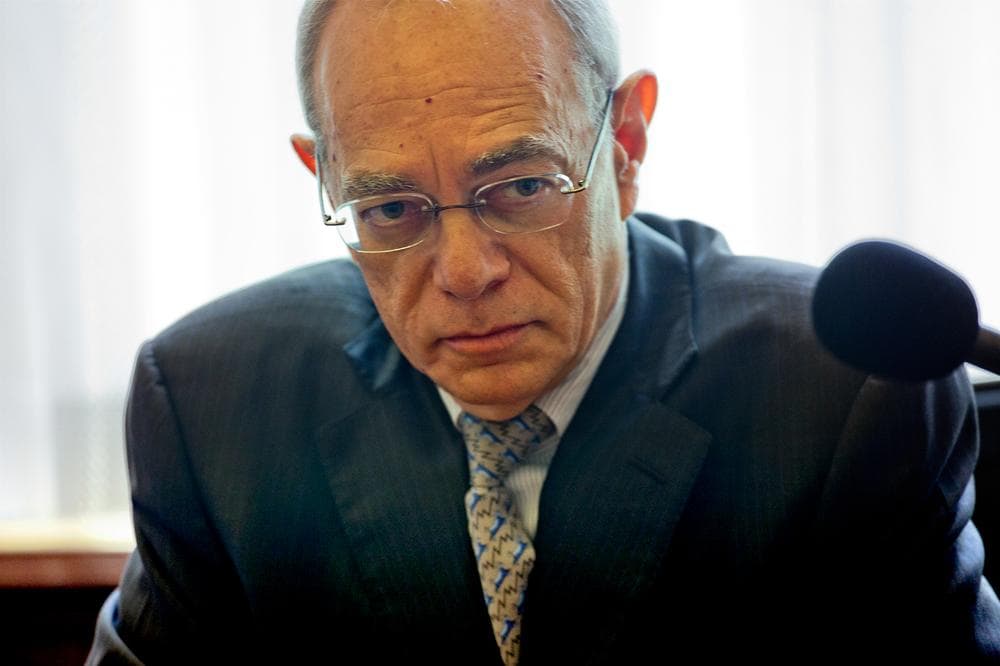Advertisement
MIT President: Heartbreaking To Hear Chinese Scientists Feel 'Stigmatized And On Edge'

In a public letter to the MIT community, university President Rafael Reif stands up for Chinese and Chinese-American colleagues and students who he says feel "unfairly scrutinized" amid rising Chinese-American tensions over academic espionage.
"We must take great care not to create a toxic atmosphere of unfounded suspicion and fear," he writes in the letter headlined "Immigration is a Kind of Oxygen."
"Looking at cases across the nation, small numbers of researchers of Chinese background may indeed have acted in bad faith, but they are the exception and very far from the rule," Reif writes. "Yet faculty members, post-docs, research staff and students tell me that, in their dealings with government agencies, they now feel unfairly scrutinized, stigmatized and on edge — because of their Chinese ethnicity alone.
"Nothing could be further from — or more corrosive to -- our community’s collaborative strength and open-hearted ideals," he continues. "To hear such reports from Chinese and Chinese-American colleagues is heartbreaking."
Reif cites government allegations of academic espionage seen as part of "a systematic effort of the Chinese government to acquire high-tech IP."
Last August, there were reports of beefed-up security efforts by the National Institutes of Health to prevent the diversion of American intellectual property overseas. Government attention seemed to focus particularly on China.
In March, the journal Science published a letter headlined "Racial Profiling Harms Science" from three groups of Chinese and Chinese-American researchers.
The letter expresses concern "about the recent political rhetoric and policies that single out students and scholars of Chinese descent working in the United States as threats to U.S. national interests."
"These developments have led to confusion, fear, and frustration among these highly dedicated professionals, who are in danger of being singled out for scapegoating, stereotyping, and racial profiling," the groups' letter says.
In that same issue of Science, NIH director Francis Collins and colleagues responded that they appreciate the groups' concerns and greatly value researchers of Chinese descent.
"The vast majority of Chinese scientists working in America are honorable, conscientious, and dedicated to the cause of expanding knowledge for the betterment of humankind," they wrote.
But the NIH response also refers to unspecified instances which the agency says violated "the honor-based systems and practices of the American research enterprise."
The response goes on to note that recommendations from a working group seeking to address the issue were made with an eye toward fairness and apply to all foreign scientists, not only those of Chinese descent.
"NIH is committed to avoiding overreaction, stigmatization, harassment, and profiling," the response concludes. "We will use our influence and bully pulpit as necessary to speak out against such prejudicial actions, for which there is no place in the biomedical research community."
In his letter, MIT President Reif adds the force of his own bully pulpit, writing that MIT flourishes because it draws talent from around the globe. He writes of his Chinese and Chinese-American colleagues:
"As scholars, teachers, mentors, inventors and entrepreneurs, they have been not only exemplary members of our community but exceptional contributors to American society. I am deeply troubled that they feel themselves repaid with generalized mistrust and disrespect."
And more broadly, he writes:
Protracted visa delays. Harsh rhetoric against most immigrants and a range of other groups, because of religion, race, ethnicity or national origin. Together, such actions and policies have turned the volume all the way up on the message that the US is closing the door – that we no longer seek to be a magnet for the world’s most driven and creative individuals. I believe this message is not consistent with how America has succeeded. I am certain it is not how the Institute has succeeded. And we should expect it to have serious long-term costs for the nation and for MIT.
For the record, let me say with warmth and enthusiasm to every member of MIT’s intensely global community: We are glad, proud and fortunate to have you with us!
